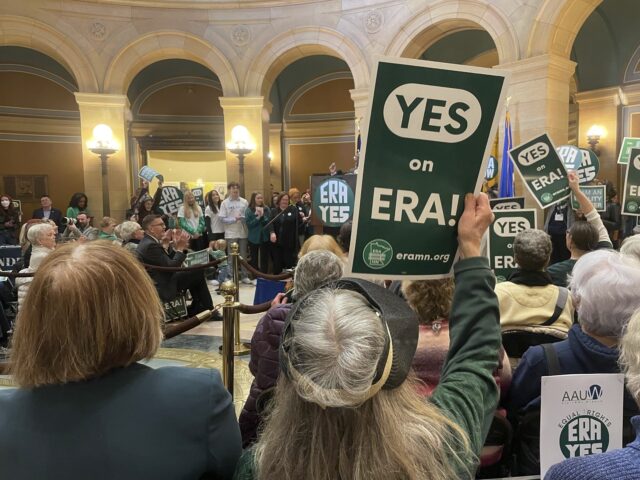Minnesota lawmakers have launched their debate on far-reaching legislation that would amend the state’s constitution to protect abortion and LGBTQ rights
Minnesota lawmakers debate constitutional amendment to protect abortion and LGBTQ rightsBy TRISHA AHMEDAssociated Press/Report for AmericaThe Associated PressST. PAUL, Minn.
ST. PAUL, Minn. (AP) — Minnesota lawmakers launched their debate Monday on far-reaching legislation to amend the constitution to protect abortion and LGBTQ rights.
The Minnesota Equal Rights Amendment would be among the nation’s most expansive protections of abortion and LGBTQ rights if it is approved by lawmakers this session and then by voters on the 2026 ballot.
Over 100 people crammed into the legislative hearing room Monday. Supporters wore green clothes and buttons that said “ERA YES” while opponents wore bright red shirts that said “NO CONSTITUTIONAL AMENDMENT to kill unborn babies.”
Betty Folliard, whose group ERA Minnesota has been pushing for such a measure since 2014, testified in support, as did members of Gender Justice — an advocacy organization for gender equity — and OutFront Minnesota, an LGBTQ+ advocacy group.
“This isn’t just about reproductive justice,” Folliard said in an interview. “It’s also about pay inequity, historic stereotypes and discrimination that keep on being overlooked, generation to generation to generation.”
The amendment’s wording would prohibit the state from discriminating against anyone on the basis of race, color, national origin, ancestry, disability or sex — including gender identity, gender expression and sexual orientation. The state also couldn’t discriminate over a person “making and effectuating decisions about all matters relating to one’s own pregnancy or decision whether to become or remain pregnant.”
Minnesota already has a non-discrimination law, the Human Rights Act, that applies to individuals, businesses, schools and other institutions. The constitutional amendment would apply to state government, and would protect certain laws — including recent ones that have made Minnesota a refuge for out-of-state people seeking an abortion and gender-affirming care — from being repealed by future lawmakers and administrations.
Carrena Falls testified in opposition. She said she’s a college student in the Twin Cities who is “repulsed” by the proposal, which would “enshrine a radical abortion agenda into our Constitution.”
Others who testified against the proposal included members of Minnesota Family Council, a Christian advocacy group; Minnesota Citizens Concerned for Life, an anti-abortion group; and Minnesota Catholic Conference, a policy organization for the Catholic Church.
Rebecca Delahunt, director of public policy at Minnesota Family Council, said she’s concerned the ERA would grant children a constitutional right to gender-affirming care.
Republican House Minority Leader Lisa Demuth said she is “very disappointed” that Democrats developed the proposal without Republican input. Her motion to submit the proposal to questioning in other House committees failed along party lines.
Democrat House Majority Leader Jamie Long’s motion advancing the proposal to the House floor succeeded with a 9-5 vote along party lines.
“These rights are so incredibly important,” Long said. “We know that Legislatures can change, and we know the courts can change. But the Constitution is the one thing that we know will stay in effect.”
If approved by the Legislature, voters in 2026 would be asked: “Shall the Minnesota Constitution be amended to say that all persons shall be guaranteed equal rights under the laws of this state, and shall not be discriminated against on account of race, color, national origin, ancestry, disability, or sex, including pregnancy, gender, and sexual orientation?”
If approved, the amendment would take effect on Jan. 1, 2027.
Last year, a different Minnesota ERA proposal passed in the Senate but did not get a final vote in the House.
Democratic Rep. Kaohly Vang Her, a chief author of both proposals, said several Democrats wanted the ERA to do more to protect transgender and reproductive rights. She said recent attacks on transgender people and the Supreme Court’s overturning of Roe v. Wade by the U.S. Supreme Court have been top of mind for many Democrats.
Democrats have only narrow majorities — their margin is just one vote in the Senate — so they need the support of most in their party if Republicans oppose the legislation. If placed on the ballot, the constitutional amendment would need to be approved by a majority of all voters casting ballots, not just a majority of those voting on the question.
___
Trisha Ahmed is a corps member for the Associated Press/Report for America Statehouse News Initiative. Report for America is a nonprofit national service program that places journalists in local newsrooms to report on under-covered issues. Follow her on X, formerly Twitter: @TrishaAhmed15

COMMENTS
Please let us know if you're having issues with commenting.